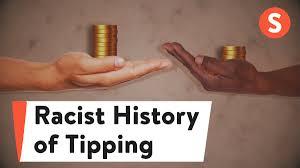Results: Racist Origin Of Tipping, And Other Rather Dark Origins
Published on 08/21/2018
QUESTIONS
GO to COMMENTS
Comments
1.
1.
Tipping—which may have originated in the taverns of 17th Century England, where drinkers would slip money to the waiter "to insure promptitude" or T.I.P for short—wasn't embraced by all Americans when the custom began to make its way into our country's taverns and dining halls. A movement against tipping began in the late 1890's as many Americans believed that tipping went against the country's ideals and allowed a clear servile class that would be financially dependent on a higher class. The anti-tipping movement believed that tipping was the "vilest of imported vices" because it created an aristocratic class in a country that fought hard to eliminate a class-driven society. After the civil war, around 1863, newly freed slaves flocked to major cities to find work. But they were only hired in what were considered "unskilled" positions, mostly in restaurants. Racist restaurant owners embraced tipping as a way to employ freed slaves without actually having to pay them any wages. And some customers were down with the new practice because they believed it was natural to tip their "inferiors." In 1915 six state legislators from Wisconsin, Illinois, Iowa, Nebraska, Tennessee and South Carolina attempted and failed to pass an anti-tipping bill that would make leaving gratuities unlawful. So, although today, tipping is a normal practice for recognizing service from restaurant staff, cab drivers, hairdressers, and pretty well anyone who performs a service, the origins are fairly racist. Did you know this?

No
74%
1522 votes
Yes
10%
209 votes
A little of it, but not this much
16%
320 votes
2.
2.
Here are some other everyday sayings or words that are rooted in racist origins. How many of these have you ever said (whether you understood the origins or not)?

"Gyp" or "Gypped" or "Jip" or "Jipped" -- This means to be cheated, swindled, or taken advantage of in modern vernacular, but it's referring to a very specific subset of people in a very negative way. The word comes from the already offensive term "gypsy," which is often used to inappropriately, and inaccurately, describe the Romani people. When the Romani moved from India to Europe, they were mistaken for Egyptians because of their dark skin, so they were dubbed "gypsies." Somewhere along the way, people concluded that all "gypsies" are thieves and swindlers, thus the term "gypped" was born.
40%
823 votes
"No Can Do" and "Long Time No See" -- In the early 20th century, "no can do" and other broken English phrases were a way to make fun of how Chinese immigrants and other ESL people attempted to communicate. The same goes for "long time no see," which was use to mock Native American Pidgin English speaking patterns.
32%
666 votes
"Paddy Wagon" -- This is a popular term for those large police vehicles that can hold multiple people who have been arrested. If the "Paddy" part of the term hasn't tipped you off yet ("Paddy" is semi-derogatory slang word for an Irishman), "paddy wagon" refers to those of Irish descent in a negative way. The term likely came about in early 20th century or late 19th century America for one of two reasons. Either it was because many police officers at the time were of Irish descent and drove those wagons, or more likely because so many people of Irish descent were being loaded up into those wagons.
34%
688 votes
"Off the Reservation" -- Basically, if you're not doing what you're supposed to be doing, someone might tell you that "you're off the reservation right now." Back in the 19th century, however, it had a very different and specific meaning. The phrase literally referred to Native Americans breaking strict U.S. government rules and leaving their designated reservation land without proper authority. Local authorities would send telegrams with messages along the lines of, "Currently no Indians are off the reservation without authority," or "We've located a band of Indians living off the reservation and plan to arrest them."
20%
411 votes
"Uppity" -- This word is often used to describe someone as being arrogant or self-important—like, "Don't get all uppity on us"—but it has a pretty disturbing history. It was originally a racist term used in the American south to describe black people who didn't know their place.
29%
591 votes
"Sold Down the River"-- People say something along the lines of "You sold me down the river!" when they've been screwed over. The phrase now means to be cheated or betrayed, like when someone gets taken advantage of. But this phrase's origin is tied to the slave trade in 19th-century America. Slave owners would often sell off troublesome slaves (usually men), literally sending them down the Mississippi river, to plantations with harsher conditions.
21%
421 votes
All of them
10%
201 votes
None of them
37%
753 votes
3.
3.
Here are a few more phrases that are terribly offensive, and often very racist. Have you ever used any of these expressions (and if you have, after seeing this survey, maybe you will refrain from using them)?

Indian-giver -- It's the schoolyard taunt that's been used for generations by children (and others) to describe people so ungenerous that they take back gifts as soon as they are given or immediately demand a present in return. This saying is so blatantly offensive, it does not even have to be explained.
39%
790 votes
Peanut gallery -- This phrase intends to reference hecklers or critics, usually ill-informed ones. In reality, the "peanut gallery" names a section in theaters, usually the cheapest and worst, where many black people sat during the era of Vaudeville.
31%
631 votes
Eskimo -- "Eskimo" comes from the same Danish word borrowed from Algonquin, "ashkimeq," which literally means "eaters of raw meat." Other etymological research suggests it could mean "snowshoe-netter" too. Either way, when we refer to an entire group of people by their perceived behaviors, we trivialize their existence and culture. Let's start using the proper terms, like Inuit.
22%
460 votes
Hip hip hooray! -- Though steeped in controversy, this first part of this phrase might relate to the Hep Hep Riots— anti-Semitic demonstrations that started in Germany in the 19th century. Germans reportedly cheered "hep hep" as they forced Jews from their homes across Europe. "Hep" is likely an acronym for "Hierosolyma est perdita," which means "Jerusalem has fallen" in Latin. The Crusaders may have used this as a battle cry, although little proof exists. Or German shepherds or hunters may have used "hep hep" as a traditional command to rally trained dogs. How about just saying "hooray"!
27%
553 votes
All
10%
213 votes
None
39%
806 votes
COMMENTS


